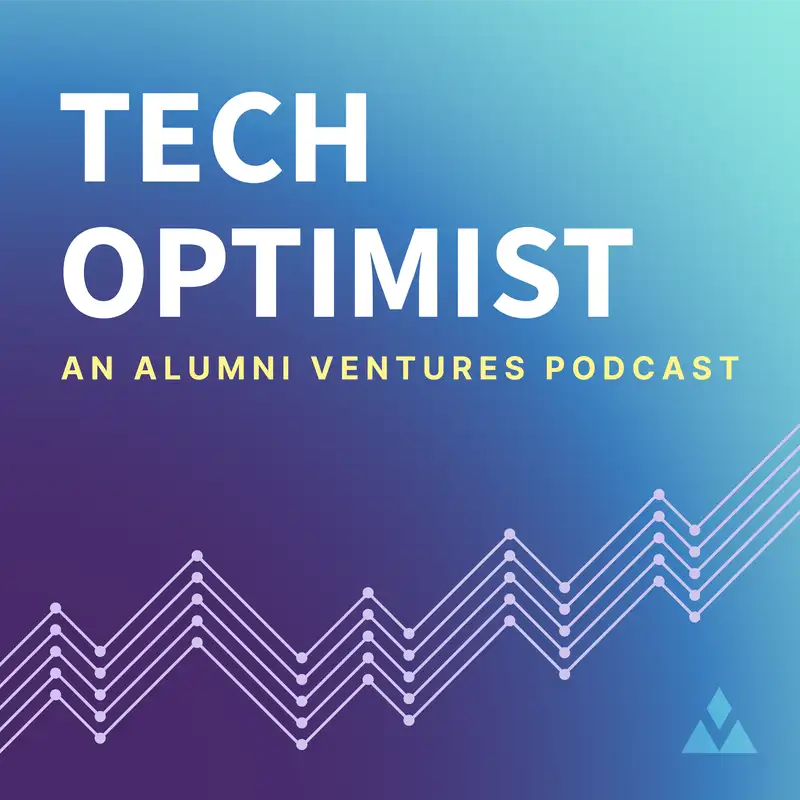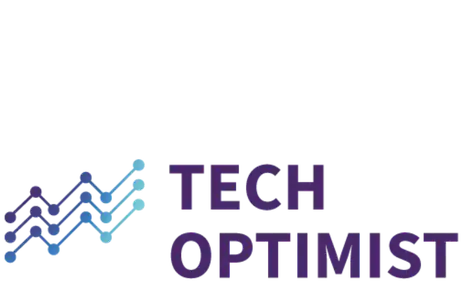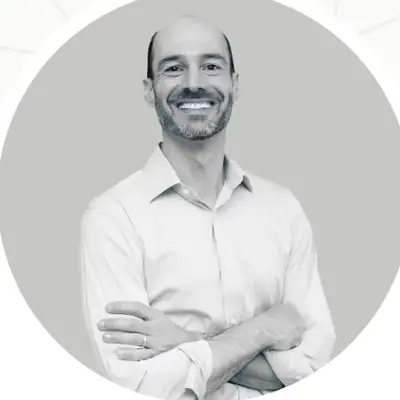#29: Three Breakthroughs: Exciting News on Alzheimer’s, Warming Globe Problems and Solutions, and Smart Antibiotics
Sam:
Hello, hello. Welcome back to the show. My name is Sam, and I'm the footnote writer for this episode. And today we're talking about a treatment for Alzheimer's. How hot this planet is in a bad bacteria killer in the form of an antibiotic. Welcome back.
Mike Collins:
Yes, the current drugs are doing amazing things, but I think we're equally excited about the pipeline more to come.
Matt Caspari:
Long story short, what they were able to conclude from all this analysis is that the summer of 2023 was the hottest we've ever had.
Mike Collins:
Obviously, antibiotics have been one of the great innovations for mankind.
Sam:
In a world captivated by criticism, it's easy to overlook the groundbreaking technologies shaping our future. Let's shine a light on innovators who are propelling us forward. As the most active venture capital firm in the US, we have an exceptional view of tech's real world impact. Join us as we explore, celebrate and contribute to the stories of those creating tomorrow. Welcome to the Tech Optimist. As a reminder, the Tech Optimist podcast is for the informational purposes only. It's not personalized advice, and it's not an offer to buy or sell securities. For additional important details, please see the text description accompanying this episode.
Mike Collins:
Okay. Welcome to the Tech Optimist, the three breakthroughs show where we get together and talk about what we think are the most important powerful technology breakthroughs of the last week or two. And I'm Mike Collins. I'm the founder and CEO of Alumni Ventures, and I'm joined by Matt Caspari, one of our managing partners out in our Menlo office. Hello, Matt.
Matt Caspari:
Hey, Mike. Good to see you.
Mike Collins:
Good. So I think I get to kick it off today. I've got a couple of healthcare things that caught my eye, the first being FDA approval of this new Alzheimer's drug. I think obviously this is something that affects most Americans directly or indirectly. I think it's something that I think all of us personally worry about affecting our loved ones, ourselves. And there has been not a lot of great news over the last period of time, some dead ends, but this drug going under the brand name, and who names these drugs, I think is a whole different conversation.
Matt Caspari:
A lot of money is actually spent drugs naming those drugs with the not so great [inaudible 00:02:53].
Mike Collins:
And picking the right color so it can imprint during the CBS nightly news on their core audience. But it's Kisunla, which is donanemab, I believe. I probably butchered those names, but this seems to be very promising, and it got recommended pretty broadly, pretty quickly. Clearly there are some costs associated with it that again, I think are concerning to all of us. It's 30, $35,000 a year, but the results are compelling. With 1700 participants, it slowed the progression of Alzheimer's by about 35% over 18 months versus placebo. Importantly, they were doing imaging and there was an 80% reduction in the amyloid plaques, and 84% in 18 months. So this is obviously one of the things that goes on with the disease is the development of these plaques, and objective scales that this was greatly reducing the progression of this disease. The reduction in these plaques is material. In fact, I think there's even was some conversation about people being able to go off of this drug.
Matt Caspari:
Interesting.
Mike Collins:
So we shall see.
Matt Caspari:
[inaudible 00:04:36].
Mike Collins:
Again, I don't think this is a cure. I don't think this was clearly getting better results for people that have early stage symptoms. Again, I think we're talking about brain damage ultimately here, so reversibility is not something I think that's on the near term horizon, but I think very promising. And again, I do think that there is an emerging pipeline. We've talked about some other drugs, GLP-1s where yes, the current drugs are doing amazing things, but I think we're equally excited about that pipeline-
Matt Caspari:
More to come.
Mike Collins:
... more to come. And I think there's likely to be an arsenal of treatments for these diseases for different conditions, different manifestations, different stages. You try one thing or you rotate off of them like we've seen in AIDS treatment, for example. So for me, this was big news.
Matt Caspari:
Yeah. That's a big breakthrough, and super exciting. And I think we're going to see this or we are seeing this trend towards more personalized medicine. So I think there'll be some segment of the population that this is a great step forward for as part of that arsenal that's coming. I know there is a lot in pipelines of large pharma and also biotechs trying to help address this.
Sam:
I've said it once, and I'll say it many more times. I'm not a doctor, I'm not a neurosurgeon, I'm not a biomedical engineer, but I am this podcast editor, and I do a lot of research for this podcast. So this first footnote of this podcast deserves a bit more context as to what exactly we're talking about here. So right after this I'm going to sort of talk about the drug that Mike mentioned and how it works. But first, I think we all need to be on the same page about Alzheimer's and how it literally affects the brain.
So in my research, I found a really awesome video by Seeker on their YouTube channel, which is called What Does Alzheimer's Do to the Human Brain? So I'm going to provide the video here for you to listen to so then when we hop into the footnote right after where we talk a little bit more about the drug and how it actually works, it's a bit more clear on how it works and all the terminology is out on the table for everyone to understand. So enjoy this video and then I'll see you right after and get into the specifics on the drug.
Speaker 4:
Alzheimer's disease is the most common cause of dementia in the world. Nearly 50 million people worldwide have it, and every 66 seconds, someone in the United States is diagnosed with it. It's been called the epidemic of our century, but even after decades of research, finding a way to prevent this disease has been a puzzle that has eluded the medical community. Now, we may be closer than ever to solving it.
Nilufer Ertekin-Taner:
I personally have a lot of hope that we will see the first survivors of Alzheimer's disease in our lifetime. I'm Nilufer Ertekin-Taner. I'm a neurologist, and I'm a neuroscientist focused on Alzheimer's disease and related dementias.
Speaker 4:
Alzheimer's disease is a progressive condition, typically starting in the part of the brain associated with memory. It then spreads, causing trouble with memory, cognitive ability and eventually loss of bodily functions. It's a relentlessly progressive condition that leads to death by or with the disease. Age is the most common risk factor for Alzheimer's. In fact, about a third of individuals ages 85 or above have it. And while the exact cause of the onset of the disease is not known, what is known is that it is characterized by a buildup of toxic proteins in the brain.
Nilufer Ertekin-Taner:
There are two main hallmarks of Alzheimer's disease in the brain. One of them is amyloid beta, which builds up in plaques outside of neurons, and the other one is tau, which is a fibrillar protein which builds up inside of neurons. Both of these proteins are toxic and ultimately they lead to dysfunction and death of neurons.
Speaker 4:
As these proteins accumulate and neurons start to die, the brain's immune system kicks into gear.
Nilufer Ertekin-Taner:
The immune cells of the brain called microglia try to get rid of this toxic protein substances, and they also try to get rid of the dead neurons.
Speaker 4:
Ultimately, this immune response leads to chronic inflammation of the brain. Over a longer period of time, as the disease progresses and neural cell death continues, the affected brain regions begin to shrink, and that's about when symptoms start to show.
Nilufer Ertekin-Taner:
Although it starts typically in areas that affect our memory, ultimately it starts affecting areas that control our movements, that control our swallowing and our breathing. And in the terminal stages of this condition, our patients with Alzheimer's disease lose their ability to move and they become bedbound, and at the end, our patients unfortunately succumb to pneumonia, malnutrition, generalized sepsis of the body, and this is all because of Alzheimer's disease and what it does in the brain.
Speaker 4:
And while all this sounds dire, decades of studies on patients show that there may be a window of opportunity to prevent the condition advancing before you would see any symptoms.
Nilufer Ertekin-Taner:
We know that 10 or 20 years before the symptoms of Alzheimer's disease can be observed, there are changes in the brain. We know this from biomarker studies looking at levels of abnormal proteins in the spinal fluid in the brain or in blood. So biomarkers are quantifiable measures that can help us detect disease or an aspect of the disease. So for example, we can think of blood glucose levels as being a biomarker for diabetes. We can think about blood pressure measurements as being a biomarker for high blood pressure. In the same vein, we have developed and continue to develop biomarkers for Alzheimer's disease.
Speaker 4:
And while these biomarkers are important to follow the disease's progression, the research is still ongoing. Right now, knowing a patient's risk factors can help them make choices to slow the onset of Alzheimer's.
Nilufer Ertekin-Taner:
Those risk factors that are bad for your heart are generally bad for your brain. So diabetes, hypertension, smoking and obesity are risk factors for Alzheimer's disease. On the flip side, what we recommend to our patients and even the general public is that they stay engaged both cognitively, physically and socially.
Speaker 4:
That can be anything from exercise to maintaining a strong social network. The takeaway seems to be stay active.
Nilufer Ertekin-Taner:
We are also at an amazing time in research and clinical studies. We are able to combine clinical information with very complex genetic and other molecular information, and this helps us try and identify the very complex molecular perturbations that can lead to this condition.
Sam:
The drug that Mike is talking about is called donanemab with the brand name Kisunla, and it is a monoclonal antibody, which is a type of immunotherapy drug. So how it works, it targets and binds to a protein called an amyloid, which builds up in the brain during the early stages of Alzheimer's disease. By binding to the amyloid, donanemab helps the body's immune system recognize and remove these protein buildups, which are thought to be toxic to brain cells. Donanemab is given intravenously through a drip through an IV about once a month, and it is designed for people in the early stages of Alzheimer's disease, including those with mild cognitive impairment or mild dementia due to Alzheimer's who confirmed elevated beta amyloid in their brain. So just like Mike had mentioned a little bit earlier, a bit more on effectiveness here. So the clinical trials showed that donanemab slowed the decline in memory and thinking skills by more than 20% compared to placebo, and it also reduced the decline in ability to carry out daily activities by 40%, so overall, a pretty good change.
And nearly half of the people taking the drug had no decline in memory and thinking skills after about one year. So what makes this new drug so revolutionary? The treatment can be stopped once these amyloid plaques, which Mike briefly talked about earlier, are cleared from the brain. So in trials, almost half of the participants were able to stop taking the drug within a year, which is pretty exciting. This is also super imperative to the Alzheimer's disease space, that this drug represents a significant advancement in the treatment for Alzheimer's, as it is one of the first drugs shown to slow the progression of the disease itself. Now it's not a cure. We want to keep that very clear on this podcast and about what Mike is bringing to the table here. This is not a cure, but it's important to note that this can help slow the fast and rapid progression of Alzheimer's disease and the damage that it does to the person afflicted with it. More on this right after this short break. Don't go anywhere.
Ludwig Schulze:
Hi. Just a brief interruption to introduce you to the Health Tech Fund from Alumni Ventures. Alumni Ventures is one of the most active and best performing VCs in the US, and we have raised over a billion dollars from more than 10,000 individual investors. With our health tech fund, you'll have the opportunity to invest in a portfolio of around 20 health tech startups from transformative healthcare services to groundbreaking diagnostics. Our founders are paving the way for a healthier future. To learn more, visit us at av.vc/funds/healthtech.
Mike Collins:
And we've talked too about this idea of clearly we all count on the FDA and our regulatory agencies to keep us safe, but I think there's always a place for the healthy debate about risk reward in that you're looking at some devastating diseases where people's certain outcome is very, very poor, where maybe there may be opportunities to allow some riskier treatments in those kinds of cases. And I think, again, some of the recent court decisions, which we do talk about and we've talked about on this show, perhaps, challenging where the regulatory agency has drawn the line, I don't think anybody with common sense is looking to make an argument, "We don't need the FDA and protect people's safety and drug safety, airline safety," nobody wants to go crazy with that stuff, but I think it's always good to have a healthy debate so we can get even more of these drugs to people sooner.
Matt Caspari:
No, great.
Mike Collins:
What's yours?
Matt Caspari:
Okay. So I came across an article in the scientific journal, Nature, and the title was, Last Year's Summer Was the Warmest in 2000 years. So these researchers did a lot of work collecting climate data from many different sources, and they reconstructed temperature trends going back 2000 years. Long story short, what they were able to conclude from all this analysis is that the summer of 2023 was the hottest we've ever had, underscoring the severity of what we're experiencing with climate change, and I think most people probably have experienced it personally. We had exceptionally high temperatures across North America, Europe. I mean really most places or many places in the world.
Mike Collins:
In Vegas, I think last week set a record at 21 or something.
Matt Caspari:
Well, we'll see what the data comes back for this summer once it's over. And the article highlighted what I think we know, but it is important maybe to just put a little more emphasis on it, or heat waves are one of the deadliest natural disasters that we have. Obviously you've got increased mortality amongst humans, but there's a lot of stress on the ecosystem, reduced harvest of crops, obviously high temperatures, extreme temperatures associated with wildfires. So there's all these negative outcomes associated with temperature, and these wildfires actually release carbon dioxide into the atmosphere, creating further warming. And the scientists highlight in this article, atmospheric CO2 levels, which if you look at the data, just continually go up into the right. We're now well over 400 parts per million, and we've known that this is an issue for a long time, and that curve is not bending.
So you're seeing many climate researchers sound the alarm on this, that we're going into uncharted territory. We may hit some of these tipping points that may put us into even worse scenarios than we're in right now. So when you look at the information that's out there, these specialists are saying we need to lower CO2 emissions to get to near zero by 2050 and then actually start pulling CO2 out of the atmosphere, so we're removing more CO2 than we emit. That's creating some really interesting trends. And this is the Tech Optimist podcast, so we invest behind a lot of these trends related to climate change. So I thought I'd just quickly talk about two examples of some of the exciting opportunities that we're seeing related to climate change. The first is a really direct one talking about the CO2 in the atmosphere issue. There are technologies that are called direct air capture or DAC, where companies are actually capturing these carbon dioxide molecules out of the air, and then they're able to put them underground and sequester them permanently.
So just one example, we've invested in several, but it's a company called Air Mine. So they're building this very efficient system to remove CO2 from the atmosphere, really with a focus on industrial scale, and what we really liked about this company was the founding team. So these were two veteran engineers from Honeywell and BASF, who have just a very practical, scalable engineering approach to get after this, so we're excited about direct air capture. The other big trend that we're seeing is transitioning the power grid to much more renewable sources of energy, solar and wind being big ones.
Obviously those power sources come and go depending on the conditions time of day. So it's created this opportunity for technologies that can efficiently store and distribute energy, produce energy with a low carbon footprint efficiently. So one example there is a company called the Mainspring Energy. We backed them, a team out of Stanford that has built this highly efficient, they call it a linear generator, so it allows them to produce onsite electricity as people need it as solar at night. If you don't have the solar power coming in, you can produce energy efficiently, so just two examples of many we've seen that we're excited about to help address this.
Mike Collins:
Yeah. I think just to build on that too, Matt, is you look at the energy needs of some of the technologies that we're big believers in AI, for example. We're big believers in distributed ledger blockchain stuff. These things have energy bottlenecks as well.
Matt Caspari:
That's what we're hearing a lot about in AI, after the chip bottlenecks, it's energy is the bottleneck.
Mike Collins:
It's energy is the bottleneck.
Matt Caspari:
Energy demands are massive.
Mike Collins:
And so again, these are opportunities as well. So as we all try to pull carbon out of the system, that's a business opportunity. Energy's an opportunity. Some of this stuff is glamorous and some of it is the blocking and tackling of infrastructure. And again, like you mentioned with that team, can you scale it? There's one thing to do it in a lab, it's another thing to do it in a kind of meaningful numbers at scale.
Matt Caspari:
This is all about massive scale. If the technologies can't scale, no impact.
Mike Collins:
Yeah. No, I mean if you look at how much carbon's being put into the system, you have to think at enormous scale to pull it out.
Matt Caspari:
Exactly.
Mike Collins:
And I think that's coming. And again, I think you mentioned two. I think we probably have a dozen to two dozen investments in that related space because it is going to happen.
Sam:
We are going to take a quick break and then we'll hop into the last footnote for this episode. We'll be right back.
Speaker 7:
Do you have a venture capital portfolio of cutting edge startups? Without one, you could be missing out on enormous value creation and a more diversified personal portfolio. Alumni Ventures ranked a top 20 VC firm by CB Insights is the leading VC firm for individual investors. Believe in investing in innovation? Visit av/vc/foundation to get started.
Sam:
All right, here we are. So Matt has some really interesting innovations to bring to the table about helping this global issue of climate change. And I figured that there's got to be a bunch of other innovations out there. Not that the ones that Matt shared weren't amazing, but I'm wondering if there were more. So I found more and I wanted to share them. So one of the biggest ones, Matt also talked about scale and how a lot of these solutions need to be large scale so that they'll actually make some headway and make a dent in the insane climate change crisis that we're dealing with right now on this planet. So I found a innovation called solar geoengineering, and it involves reflecting a portion of the sun's energy back into space to cool the planet. So techniques include deploying reflective particles or aerosols in the atmosphere to create a sort of sunshade.
There's obviously DAC, which Matt talked about. There also is ocean fertilization. This method involves adding nutrients to the ocean to simulate the growth of phytoplankton, which can absorb CO2 through photosynthesis. There's also space-based solar power. This concept involves placing solar panels in space to collect solar energy and transmit it back to earth via a microwave or laser beams. There's obviously geothermal energy. There's green methanol and biofuels, which we've talked about many times in this podcast. There's advanced geothermal power where startups like Fervo are developing advanced geothermal power generation techniques that harness hot rocks deep underground to produce steam for electricity, that one is pretty cool. There's also some super futuristic options like smart cities, which utilize technology including AI and smart sensors that are implemented to reduce urban emissions and improve air quality.
Mike Collins:
So my third one, I'm going to go back to healthcare. We've talked a little bit about antibiotics in prior episodes, but again, just a new antibiotic that was just released. Now, one of the issues, again, just to lay the groundwork with the dual edge of technology is obviously antibiotics have been one of the great innovations for mankind and directly have impacted longevity and reduced suffering, really a miracle, just the whole innovation of antibiotics. One of the unintended negative consequences as we've learned, is really we've talked about resistant strains, but we've also, and I don't think we've touched on this, which is the emerging science that it screws up your microbiome and the importance of our gut health to our health period, signaling just associations with our immune system, with autoimmune issues, et cetera. We go on and on about, and again, our big investors in technologies that are related to what the understanding and the improvement of the human gut, if you will, to make it simple.
But one of the things about this new antibiotic, Lolo Mycin, is it really uses some new technology that has clinicians very excited. This comes out of University of Illinois Urbana, I believe, and it's really a next generation antibiotic has been released. And one of the things that has people very excited about the mechanism and pathways it uses simplistically are worse for bad bacteria than the good bacteria in your microbiome. Again, one of the issues of potentially related to obesity and autoimmune issues is we are using generously antibiotics with kids from a very early age now. And one of the things that I know a lot of doctors and people very thoughtful in the space, if they go on an antibiotic, they go on a very rigorous regimen to rebuild their microbiome. And if we can develop a class of what I'm going to call smart antibiotics that are just not broad scale, but just we can go in and kill what we want to kill and not take out-
Matt Caspari:
Not everything [inaudible 00:28:17].
Mike Collins:
Take out your [inaudible 00:28:19]. I've heard the microbiome, a healthy one is described as a lush forest with an incredibly diverse environment. And unfortunately, a lot of the antibiotics are like Agent Orange and they just take out everything. And so this is, as I've read and have listened to people, discuss Lolo Mycin, that this is maybe the first in a new direction that we're going to head with smart antibiotics, so one that I think is of note and really exciting to the positive.
Matt Caspari:
Yeah. No, that's a great one.
Mike Collins:
Well, again, another great week in technology, amazing people doing work. You don't read about it at the front page of the newspaper, but a cause for celebration, and that we have our challenges, but a lot of great science being done, a lot of great people doing really hard work and moving us all forward. So thank you, Matt. We'll do it again next week.
Matt Caspari:
Yeah. See you. Have a great rest of your week.
Mike Collins:
Excellent. Thank you.
Matt Caspari:
Take care.
Sam:
Thanks again for tuning into the Tech Optimist. If you enjoyed this episode, we'd really appreciate it if you'd give us a rating on whichever podcast app you're using, and remember to subscribe to keep up with each episode. The Tech Optimist welcomes any questions, comments or segment suggestions. So please email us at info@techoptimist.vc with any of those, and be sure to visit our website @av.vc. As always, keep building.








